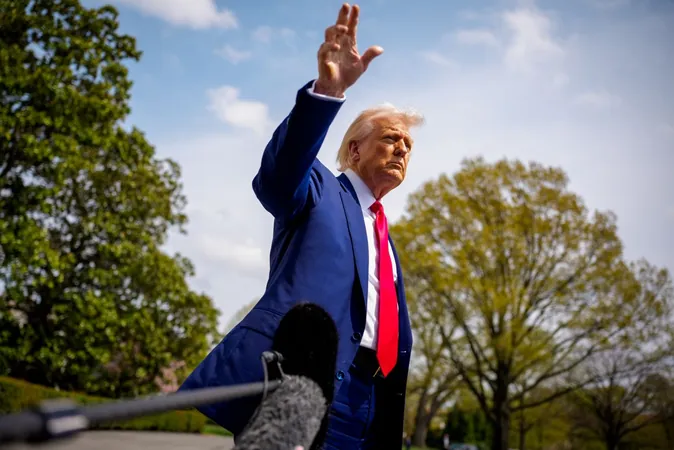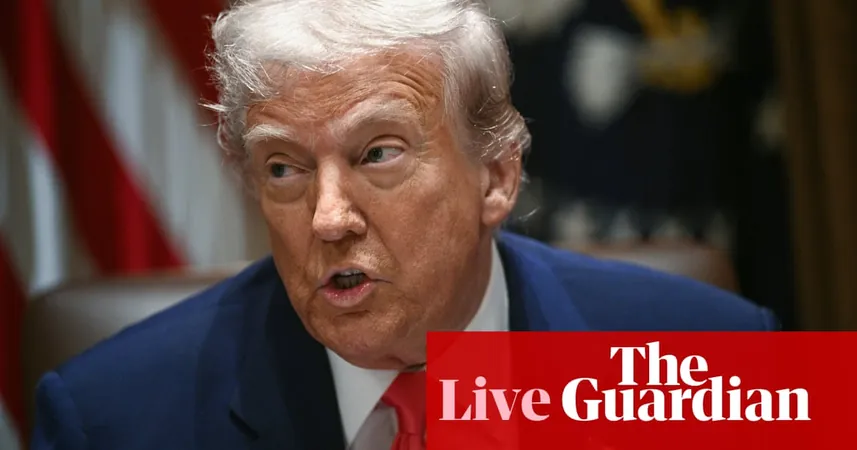
Is 'Mineral Diplomacy' Just Another Form of Exploitation in Ukraine?
2025-04-07
Author: Jacob
Introduction
Eleven years after Russia’s initial armed seizure of Ukrainian territory and three years into a full-scale invasion, Ukraine finds itself confronting an alarming new threat to its sovereignty. U.S. President Donald Trump has proposed a controversial "agreement" demanding Ukraine surrender a substantial portion of its mineral wealth; failure to comply could mean facing future Russian interventions without American backing.
Concerns and Reactions
This proposition has sparked skepticism among mining experts, and strong objections from Kyiv. Surprisingly, it has garnered bipartisan support in the U.S., even as it disregards the aspirations of the Ukrainian populace. Rather than strengthening ties between the two nations through a cooperative economic bond, many predict that this so-called mineral deal will culminate in disaster for both Ukrainians and Americans.
Warning from Analysts
Analysts warn that a coercive deal devoid of genuine negotiation and community input will exacerbate Ukraine’s ongoing humanitarian crisis while undermining long-term development. While Trump correctly identifies a pressing need for critical minerals—such as lithium, graphite, and rare earth elements critical for future energy technologies—history demonstrates that agreements lacking local consent are repositories for failure. Oxfam’s extensive experience in mining sectors reveals that when communities cannot influence mining methods or operations in their regions, they are likely to resist, leading to costly protests and litigation for both corporations and governments.
Complexities of Mining Operations
In conflict-impacted areas like Ukraine, mining operations are particularly fraught with complexities. Issues such as land disputes and human rights violations are prevalent. Currently, 70% of Ukraine’s critical minerals remain untapped, with an average of 18 years needed to bring new production online, suggesting that any immediate benefits of resource extraction are unlikely.
Challenges to Trump's Proposal
Even with Trump’s revised proposal, which may now extend to oil and gas, serious challenges remain. Gun-barrel diplomacy, characterized by a lack of genuine consultation, will not sustainably enhance the mineral supply chain or offset financial losses.
Lessons from History
Historical precedents caution against unregulated resource extraction under duress. Erik Prince's ill-fated attempt to finance the Afghanistan war through mining serves as a stark reminder of how such strategies often lead to failure. Additionally, Russia's mining exploits through groups such as Wagner highlight the dangers of sidelining governance and accountability.
Risks of Unchecked Extraction
Unchecked mineral extraction in Ukraine threatens not only to deepen corruption but also to sow social unrest, jeopardizing both the profitability of private enterprises and the state's responsibility to its citizens. It can effectively dismantle Ukraine’s prospects for stable growth in a post-war context.
Alternatives and Recommendations
There are better alternatives to explore. Firstly, both the U.S. and Ukrainian governments must temper expectations regarding short-term profits from mining. Developing Ukraine’s mineral resources is an extensive process that will not yield instant security benefits. Given that Ukraine faces a staggering recovery cost of approximately $524 billion, these resources should be redirected toward creating a long-term national fund aimed at rebuilding infrastructure and supporting humanitarian needs rather than hastily transferring wealth under duress.
Secondly, U.S. policy should prioritize constructing a resilient mineral supply chain that involves actual community engagement in decision-making regarding mining projects. Efforts should also focus on fostering a favorable business landscape. The mining industry itself, reflecting on its commitments to human rights, must actively advocate for sensible policies in regions affected by conflict instead of permitting the erosion of anti-corruption measures.
Finally, and perhaps most crucially, policymakers must work toward achieving a just, sustainable peace that acknowledges Ukraine’s territorial integrity and prioritizes the safety of its citizens.
Conclusion
The unfolding narrative around this new wave of “mineral diplomacy” underscores a critical geopolitical reality shaped by the resources beneath the soil. True diplomacy necessitates respect and collaboration rather than exploitation. If U.S.-Ukraine relations descend into what could be termed "mineral colonialism"—characterized by condescension and dominion, neglecting the needs and rights of the Ukrainian people—both nations will ultimately bear the cost.
The continued vigilance and involvement of all stakeholders are essential in forging a path forward that genuinely benefits the Ukrainian populace while addressing critical resource needs on the global stage.









 Brasil (PT)
Brasil (PT)
 Canada (EN)
Canada (EN)
 Chile (ES)
Chile (ES)
 Česko (CS)
Česko (CS)
 대한민국 (KO)
대한민국 (KO)
 España (ES)
España (ES)
 France (FR)
France (FR)
 Hong Kong (EN)
Hong Kong (EN)
 Italia (IT)
Italia (IT)
 日本 (JA)
日本 (JA)
 Magyarország (HU)
Magyarország (HU)
 Norge (NO)
Norge (NO)
 Polska (PL)
Polska (PL)
 Schweiz (DE)
Schweiz (DE)
 Singapore (EN)
Singapore (EN)
 Sverige (SV)
Sverige (SV)
 Suomi (FI)
Suomi (FI)
 Türkiye (TR)
Türkiye (TR)
 الإمارات العربية المتحدة (AR)
الإمارات العربية المتحدة (AR)